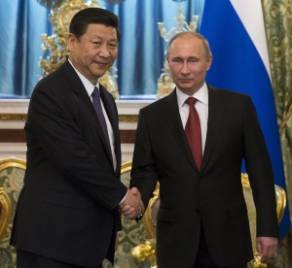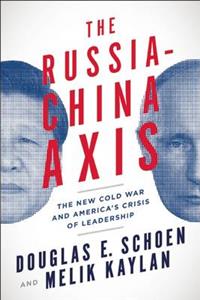The Ukraine crisis has made Russia more dependent on China. Putin is popular in Beijing, and Putin and Chinese leader Xi Jinping are the best of friends. But can China save Russia from its crisis?
!["Yalta summit 1945 with Churchill, Roosevelt, Stalin" by [1] The source web page include the following caption: Photo #: USA C-543 (Color). Licensed under Public Domain via Wikimedia Commons - http://commons.wikimedia.org/wiki/File:Yalta_summit_1945_with_Churchill,_Roosevelt,_Stalin.jpg#mediaviewer/File:Yalta_summit_1945_with_Churchill,_Roosevelt,_Stalin.jpg](http://blogs.prio.org/wp-content/uploads/2015/02/Yalta_summit_1945_with_Churchill_Roosevelt_Stalin-1-292x235.jpg)
Chiang Kai-shek was not informed. Yalta summit 1945 with Churchill, Roosevelt and Stalin. (Licensed under Public Domain via Wikimedia Commons)
Jealous of Stalin
Russia’s president, Vladimir Putin, undoubtedly envies Stalin. Putin believes that the break-up of the Soviet Union in 1991 was the greatest catastrophe of the 20th century. His dream is to resurrect a strong Russia in cooperation with its neighbours. Putin experienced a humiliating set-back in February 2014, when he failed to stop a Western-inspired uprising in Kiev – the first capital of Russia. The protesters in Kiev’s Maidan Nezalezhnosti, or ‘independence square’, crushed Putin’s hopes of reuniting Russia with Ukraine in a strong union. Putin’s reaction was to take Crimea by force and send soldiers to assist rebels in eastern Ukraine. The result was to isolate and weaken Russia. The West imposed sanctions, and the situation became even worse when falling energy prices undermined the Russian economy. Poland declined to invite Putin to the ceremonies held to mark the 70th anniversary of the Soviet army’s liberation of Auschwitz. When a sculpture of Roosevelt, Churchill and Stalin was unveiled in Yalta in February, no politically important guests were in attendance.
The “Asianisation” of Russia

Best friends: Xi Jinping and Vladimir Putin in the Kremlin in 2013. Photo: Alexander Zemlianichenko
Under Putin, the centre of gravity of Russian foreign policy has shifted eastwards. Ever since the turn of the millennium, Putin has been endeavouring to strengthen Russia’s relationship with China. Putin is more popular in China than any other foreign leader. Putin stands up to the West in a way that inspires admiration in China. He is not afraid to use force. And the Chinese take note of his domestic popularity. China’s Russia pundits believe that Putin will retain his people’s support even in difficult times.
In Moscow this coming May, when Putin will be celebrating Russia’s victory over Nazi Germany, Xi Jinping and the North Korean leader Kim Jong-un are likely to be the most prominent guests. Obama has turned down the invitation, and other Western leaders will likely also stay away. Russia has invited the South Korean president Park Geun-hye – giving her an opportunity to meet Kim Jong-un – but she is also likely to decline the invitation. Japanese prime minister Shinzo Abe is even more likely to decline. In August/September, when the Chinese will hold ceremonies to commemorate victory over Japan, it will be Putin’s turn to visit China and participate in China’s attempts to discourage Shinzo Abe from amending Japan’s pacifist constitution, which was imposed by the United States in 1946.
This global power shift from West to East is also causing the “Asianisation” of history. Last year, as the West commemorated the 100th anniversary of World War I, there was much discussion as to whether the next world war would be likely to start in Asia. And now the Ukraine crisis means that Russia will celebrate victory in World War II in the company of China and North Korea, rather than with its European allies.
China is now the stronger partner
When Stalin entered into an alliance with the People’s Republic of China in 1950, after China’s communists had – to Stalin’s surprise – emerged victorious from civil war against Chiang Kai-shek, the Soviet Union was the stronger partner. China needed – and received – the Soviet Union’s support. In the 1960s, China’s leader Mao Zedong distanced the country from the Soviet Union. In 1964, China detonated its first atomic bomb, and in 1969, Mao provoked a border war with the Soviet Union. From 1972, when President Richard M. Nixon visited Mao, China and the United States stood together against the Soviet Union. This unholy alliance between the United States and China lasted until the end of the Cold War. In 1989, Mikhail Gorbachev, the last leader of the Soviet Union, visited China. In 1996, Russia and China entered into a “strategic partnership”. Since Putin came to power in 2000, this partnership has grown ever closer, with cooperation in many different areas.
In 2014, Putin declared that the relationship between the two countries was better than it had been for over 100 years. What he failed to mention was that the balance of power had shifted. While China is now Russia’s most important trading partner, Russia only ranks as ninth in importance for China. China has been a good customer for Russia’s arms industry, but its need for Russian weapons has gradually decreased as it has developed the technology to produce its own advanced weapons. Even Russia’s most important export to China, energy, is currently less significant. In 2014, Putin entered into two agreements with China to supply massive quantities of gas. Both these agreements, however, require a major programme of investment, to be funded by China. With energy prices at their current lows, it is far from certain that China will put up the money. China has reason to doubt whether Russia will manage actually to supply as much gas as promised. In addition, China has entered into a competing gas agreement with Turkmenistan.
An unstable axis
 Last year, in the light of the Ukraine crisis, two American journalists, Douglas Schoen and Melik Kaylan, published a book titled The Russia-China Axis. Schoen and Kaylan attack President Obama for under-estimating the Sino-Russian threat, which they claim is here to stay. It may well be that they are mistaken. In 2008, Bobo Lo, an expert on Sino-Russian relations, came closer to hitting the nail on the head in his book Axis of Convenience. According to Lo, it is convenient for Russia and China to cooperate in the current global environment, but Russia needs China more than China needs Russia. The Chinese are concerned about Putin’s lack of economic responsibility. They know that China’s economic development is far more dependent on trade with Japan, the United States and the EU than with Russia. Putin may be miscalculating if he is putting his faith in China to rescue his regime from collapse.
Last year, in the light of the Ukraine crisis, two American journalists, Douglas Schoen and Melik Kaylan, published a book titled The Russia-China Axis. Schoen and Kaylan attack President Obama for under-estimating the Sino-Russian threat, which they claim is here to stay. It may well be that they are mistaken. In 2008, Bobo Lo, an expert on Sino-Russian relations, came closer to hitting the nail on the head in his book Axis of Convenience. According to Lo, it is convenient for Russia and China to cooperate in the current global environment, but Russia needs China more than China needs Russia. The Chinese are concerned about Putin’s lack of economic responsibility. They know that China’s economic development is far more dependent on trade with Japan, the United States and the EU than with Russia. Putin may be miscalculating if he is putting his faith in China to rescue his regime from collapse.
This text was published in Norwegian in Aftenposten 4 February 2015: Kan Putin stole på Kina?
Translation from Norwegian: Fidotext